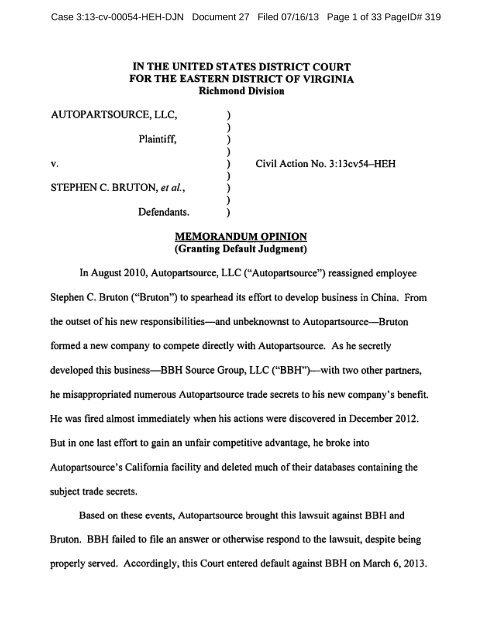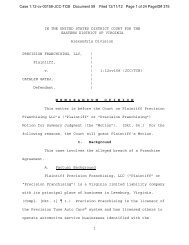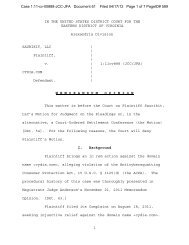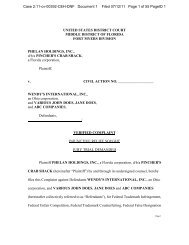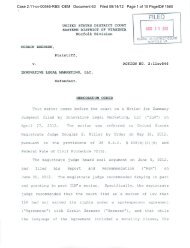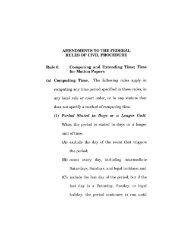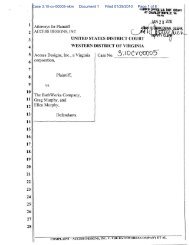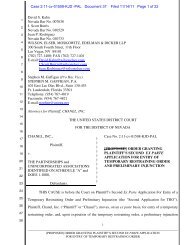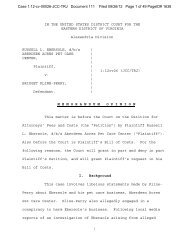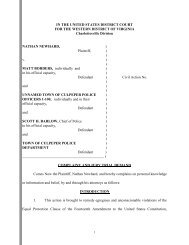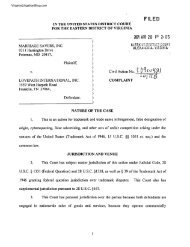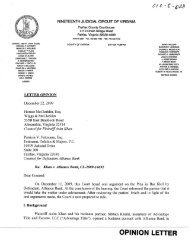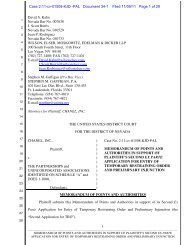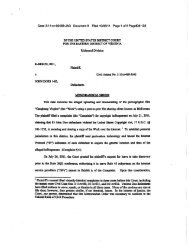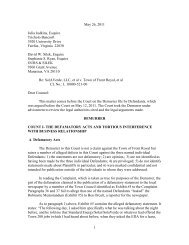Autopartsource, LLC v. Bruton - Virginia Business Litigation Lawyer ...
Autopartsource, LLC v. Bruton - Virginia Business Litigation Lawyer ...
Autopartsource, LLC v. Bruton - Virginia Business Litigation Lawyer ...
Create successful ePaper yourself
Turn your PDF publications into a flip-book with our unique Google optimized e-Paper software.
Case 3:13-cv-00054-HEH-DJN Document 27 Filed 07/16/13 Page 1 of 33 PageID# 319IN THE UNITED STATES DISTRICT COURTFOR THE EASTERN DISTRICT OF VIRGINIARichmond DivisionAUTOPARTSOURCE, <strong>LLC</strong>, ))Plaintiff,)v.)) Civil Action No. 3:13cv54-HEHSTEPHEN C. BRUTON, et al.,Defendants.))))MEMORANDUM OPINION(Granting Default Judgment)In August 2010, <strong>Autopartsource</strong>, <strong>LLC</strong> ("<strong>Autopartsource</strong>") reassigned employeeStephen C. <strong>Bruton</strong> ("<strong>Bruton</strong>") to spearhead its effort to develop business in China. Fromthe outset of his new responsibilities-and unbeknownst to <strong>Autopartsource</strong>-<strong>Bruton</strong>formed a new company to compete directly with <strong>Autopartsource</strong>. As he secretlydeveloped this business-BBH Source Group, <strong>LLC</strong> ("BBH")-with two other partners,he misappropriated numerous <strong>Autopartsource</strong> trade secrets to his new company's benefit.He was fired almost immediately when his actions were discovered in December 2012.But in one last effort to gain an unfair competitive advantage, he broke into<strong>Autopartsource</strong>'s California facility and deleted much of their databases containing thesubject trade secrets.Based on these events, <strong>Autopartsource</strong> brought this lawsuit against BBH and<strong>Bruton</strong>. BBH failed to file an answer or otherwise respond to the lawsuit, despite beingproperly served. Accordingly, this Court entered default against BBH on March 6, 2013.
Case 3:13-cv-00054-HEH-DJN Document 27 Filed 07/16/13 Page 2 of 33 PageID# 320<strong>Autopartsource</strong> now moves for default judgment, seeking $1,131,801.55 in compensatorydamages, $350,000 in punitive damages, $59,409.72 in attorneys' fees and costs, aworldwide production injunction to last seven years, and a permanent injunctionprohibiting the use of <strong>Autopartsource</strong>'s trade secrets. Given the extensive nature of theremedies sought, the Court held an evidentiary hearing to address the matter on July 10,2013. For the reasons that follow, the Court will grant default judgment, but will tempersomewhat the amount of damages and limit the scope of injunctive relief to a degree.I. FINDINGS OF FACT 1Because Defendant BBH is in default, the well-pleaded allegations in theComplaint are deemed admitted for purposes of the Motion for Default Judgment. Ryanv. Homecomings Fin. Network, 253 F.3d 778, 780 (4th Cir. 2001) (quoting NishimatsuConstr. Co., Ltd. v. Houston Nat'l Bank, 515 F.2d 1200, 1206 (5th Cir. 1975) (quotingThomson v. Wooster, 114 U.S. 104, 113 (1884) (citations and internal quotation marksomitted»); see also Directv, Inc. v. Rawlins, 523 F.3d 318,322 n.2 (4th Cir. 2008)(citation omitted). Additionally, <strong>Autopartsource</strong> has submitted numerous documentaryIThe Court exercises diversity jurisdiction over this case pursuant to 28 U.S.C. §1332, because the amount in controversy exceeds $75,000 and the parties are completelydiverse. To be clear, the parties are completely diverse because <strong>Autopartsource</strong> is alimited liability company whose members are all citizens of New Jersey; BBH is alimited liability company whose members are citizens of China, California, and <strong>Virginia</strong>;and, <strong>Bruton</strong> is a citizen of California. Cent. W. Va. Energy Co. v. Mt. State Carbon, <strong>LLC</strong>,636 F.3d 101, 103 (4th Cir. 2012) ("For purposes of diversity jurisdiction, the citizenshipof a limited liability company ... is determined by the citizenship of all of itsmembers."). Moreover, the Court properly exercises personal jurisdiction overDefendant BBH pursuant to Va. Code § 8.0 1-328.1 (A)(1), because BBH transactsbusiness in <strong>Virginia</strong>, and BBH's registered agent in <strong>Virginia</strong> accepted service of processon its behalf. (Aff. of Service, ECF No.5.)2
Case 3:13-cv-00054-HEH-DJN Document 27 Filed 07/16/13 Page 3 of 33 PageID# 321exhibits and declarations and offered the testimony of John Amalfe ("Amalfe"), Presidentof <strong>Autopartsource</strong>, at an evidentiary hearing. These sources form the basis for thefollowing findings of fact.Since 2004, <strong>Autopartsource</strong> has been in the business of manufacturing anddistributing aftermarket automobile parts. (Compl. at ~~ 1,9-10.) Generally, these partsare "sourced" in China-meaning, they are often manufactured by a third-party hired todo so by <strong>Autopartsource</strong>. (Id. at ~12.)Over the course of its existence, <strong>Autopartsource</strong>has developed a body of proprietary information and trade secrets related to its businessoperations. These include industry contacts, customer information, pricing, costs, vendorinformation, and product development data. (ld. at ~ 15.)None of this information can be easily recreated from public sources withoutsignificant time, effort, and expense. (ld.) While its employees have access to its tradesecrets, <strong>Autopartsource</strong> maintains a number of security features and policies designed toprotect this information. (Id. at ~~ 16-21.) This includes a confidentiality policygoverning all employees. (ld. at ~ 21.)Soon after its founding, <strong>Bruton</strong> obtained employment with <strong>Autopartsource</strong> as itsDirector of Product Development. (ld. at ~ 24.) In this capacity, he would determinewhat aftermarket parts substitute for original parts in new and existing automobiles.Essentially, this data would allow <strong>Autopartsource</strong> to mimic existing automobile parts.According to Amalfe's testimony, this product development data is among<strong>Autopartsource</strong>'s most valuable trade secrets. Additionally, <strong>Bruton</strong> had access to muchof <strong>Autopartsource</strong>'s other confidential and proprietary information, including customer3
Case 3:13-cv-00054-HEH-DJN Document 27 Filed 07/16/13 Page 4 of 33 PageID# 322data, pricing information, and marketing data. (Id. at ~ 27.) Of particular relevance tothe allegations in this case, <strong>Bruton</strong> gained familiarity with <strong>Autopartsource</strong>'s strategicrelationship with Intex Auto Parts ("Intex"), a customer of <strong>Autopartsource</strong>. (/d.)By 2010, <strong>Bruton</strong>'s responsibilities at the company expanded to include thesourcing of automobile parts in China. (/d. at ~ 29.) To prepare him for this role,<strong>Autopartsource</strong> trained <strong>Bruton</strong> for international work, reassigned Chinese national LiliHuang ("Huang") to work directly with him as a contractor, and sent him to a number oftrade shows and to China to develop business relations in that country. (Id. at ~~ 29-33.)Huang had previously been hired in 2010 as a Quality Control Contractor, subject to anagreement that she would not represent any other company while contracted by<strong>Autopartsource</strong>. (/d. at ~ 31.) In their new capacities, both <strong>Bruton</strong> and Huang obtainedbroader access to <strong>Autopartsource</strong>'s trade secrets. (/d. at ~ 35.)In August 2011, unbeknownst to <strong>Autopartsource</strong>, <strong>Bruton</strong> and Huang formed BBHwith the intent to compete directly with <strong>Autopartsource</strong>. 2 (Id. at ~~ 38-42, 57.) Theyintended from the outset to use <strong>Autopartsource</strong>'s goodwill, business opportunities, tradesecrets, and company resources to generate business for BBH. (/d. at ~~ 57, 62-66.) Asone specific example, in January 2012, BBH brokered a deal to distribute brake rotors toIntex, an <strong>Autopartsource</strong> customer, even though <strong>Autopartsource</strong> had specifically sent<strong>Bruton</strong> to China to secure the same deal for itself. (Id. at ~ 63.) Based on its contacts inthe industry, <strong>Autopartsource</strong> has reason to believe that BBH is still doing business with2<strong>Bruton</strong> and Huang had a third business partner, Mitchell Bennett, whose role inthe company is not relevant here.4
Case 3:13-cv-00054-HEH-DJN Document 27 Filed 07/16/13 Page 5 of 33 PageID# 323Intex.By late December 2012, Huang came clean to her colleagues at <strong>Autopartsource</strong>,voluntarily disclosing the existence ofBBH and <strong>Bruton</strong>'s role in it. (ld. at ~ 38.) Afternearly one year in business, BBH was revealed as an unknown competitor operated by anemployee and a contractor. (Id.) After confronting <strong>Bruton</strong> and terminating hisemployment, <strong>Autopartsource</strong> seized his company-supplied laptop computer. (Id. at ~~38-43.)<strong>Bruton</strong> subsequently tricked a former co-worker to give him access to the laptopon December 31, 2012 for less than five minutes-purportedly to verify his accruedvacation time. (ld. at ~ 47.) Somehow, <strong>Bruton</strong> (or someone acting on his behalf) againgained access to the laptop as many as two more times over the next day. (Id. at ~~ 49-50.) As computer forensic analysis later revealed, <strong>Bruton</strong> used these opportunities todelete much of <strong>Autopartsource</strong>'s trade secrets, attempting to hide BBH's use of thosematerials and foreclosing <strong>Autopartsource</strong>'s further use of much of its own proprietaryinformation. (ld. at ~ 51.)After these events unfolded, <strong>Autopartsource</strong> brought this action against BBH and<strong>Bruton</strong>. All claims against <strong>Bruton</strong> have been automatically stayed because he has sincefiled for bankruptcy. Of relevance here, <strong>Autopartsource</strong> brings the following claimsagainst BBH: (1) violation of the <strong>Virginia</strong> Uniform Trade Secrets Act ("VUTSA"); (2)tortious interference with contract; and, (3) tortious interference with business5
Case 3:13-cv-00054-HEH-DJN Document 27 Filed 07/16/13 Page 6 of 33 PageID# 324expectancy.3 BBH was properly served but failed to file any answer or otherwise defendthe lawsuit within the proscribed time to do so (or since, for that matter). Accordingly,default was entered against BBH. <strong>Autopartsource</strong> now seeks default judgment, to include$1,131,801.55 in actual damages, $350,000 in punitive damages, $59,404.72 in attorneys'fees and costs, and broad worldwide and permanent injunctive relief. While it has clearlyestablished liability, the Court ordered that an evidentiary hearing be held to determinewhether the extent of relief sought is appropriate.II. STANDARD OF REVIEWUnder Fed. R. Civ. P. 55(a), a default is entered when "a party against whom ajudgment for affirmative relief is sought has failed to plead or otherwise defend .... " Asubsequent entry of default judgment is left to the sound discretion of the trial court.Payne v. Brake, 439 F.3d 198,203 (4th Cir. 2006); Augusta Fiberglass Coatings, Inc. v.Fodor Contracting Corp., 843 F.2d 808,810 (4th Cir. 1988).Rule 55 of the Federal Rules of Civil Procedure authorizes the entry of adefault judgment when a defendant fails to plead or otherwise defend inaccordance with the Rule. Although the clear policy of the Rules is toencourage dispositions of claims on their merits, trial judges are vested withdiscretion, which must be liberally exercised, in entering [default]judgments and in providing relief therefrom.us. v. Moradi, 673 F .2d 725, 727 (4th Cir. 1982) (citations and internal quotation marksomitted); see also United States CFTC v. PMC Strategy, <strong>LLC</strong>, 903 F. Supp. 2d 368, 3753 As a federal court sitting in <strong>Virginia</strong> and exercising diversity jurisdiction, theCourt applies <strong>Virginia</strong>'s choice oflaw rules. Felder v. Casey, 487 U.S. 131, 151 (1988)(citation omitted). Because <strong>Autopartsource</strong> maintains its company headquarters in<strong>Virginia</strong>, injury from tortious conduct was suffered in <strong>Virginia</strong>. Thus, <strong>Virginia</strong> lawgoverns the claims against BBH. Dreher v. Budget Rent-A-Car Sys., Inc., 634 S.E.2d324, 327 (Va. 2006).6
Case 3:13-cv-00054-HEH-DJN Document 27 Filed 07/16/13 Page 7 of 33 PageID# 325(W.O.N.C. 2012) (citation omitted).When a defendant is in default, the plaintiffs well-pleaded allegations are deemedadmitted. Ryan, 253 F .3d at 780 (citations and internal quotation marks omitted). At thesame time, "[t]he defendant is not held ... to admit conclusions of law" and it remainsthe Court's responsibility to determine whether the allegations "support the reliefsought." Id. (citations and internal quotation marks omitted). In fashioning appropriaterelief, the district court may rely on affidavits and documentary evidence whereappropriate, or instead conduct an evidentiary hearing if it deems it necessary. UnitedStates CFTC, 903 F. Supp. 2d at 375 (citations omitted).III. DISCUSSIONA. Claims Serving as the Basis for Damages<strong>Autopartsource</strong> asserts three claims against BBH: (I) violation ofVUTSA, (2)tortious interference with a contract, and (3) tortious interference with businessexpectancy. Deeming the allegations in the Complaint to be true, <strong>Autopartsource</strong> appearsto have established liability on all three theories, but can only recover under two of thosetheories. The Court addresses each in tum.1. VUTSAUnder the <strong>Virginia</strong> Uniform Trade Secrets Act ("VUTSA"), Va. Code §§ 59.1-336through 343, misappropriation is defmed as:1. Acquisition of a trade secret of another by a person who knows orhas reason to know that the trade secret was acquired by impropermeans; or7
Case 3:13-cv-00054-HEH-DJN Document 27 Filed 07/16/13 Page 8 of 33 PageID# 3262. Disclosure or use of a trade secret of another without express orimplied consent by a person who:a. Used improper means to acquire knowledge of the tradesecret; orb. At the time of disclosure or use, knew or had reason to knowthat his knowledge of the trade secret was:(1) Derived from or through a person who had utilizedimproper means to acquire it;(2) Acquired under circumstances giving rise to a duty tomaintain its secrecy or limit its use;(3) Derived from or through a person who owed a duty tothe person seeking relief to maintain its secrecy orlimit its use; or(4) Acquired by accident or mistake.Va. Code § 59.1-336. In tum, "trade secrets" are defined as "information, including butnot limited to, a formula, pattern, compilation, program, device, method, technique, orprocess," that:1. Derives independent economic value, actual or potential, from notbeing generally known to, and not being readily ascertainable byproper means by, other persons who can obtain economic value fromits disclosure or use, and2. Is the subject of efforts that are reasonable under the circumstancesto maintain its secrecy.ld. Although there are several permissible avenues which the claim may be prosecutedunder Va. Code § 59.1-336, <strong>Autopartsource</strong> need only satisfY one of the availablesubsections to state the claim.Here, <strong>Bruton</strong> used his position at <strong>Autopartsource</strong> to acquire confidential and8
Case 3:13-cv-00054-HEH-DJN Document 27 Filed 07/16/13 Page 9 of 33 PageID# 327proprietary information from his employer, including databases of current andprospective vendors, product quality data, cost and pricing data, and historical sales data.(Compl. at "66, 73.) Based on the allegations, this information "[ d]erives independentvalue ... from not being generally known" and <strong>Autopartsource</strong> has taken steps"reasonable under the circumstances to maintain its secrecy." Va. Code § 59.1-336.Knowing that these data sources constitute protected trade secrets-as demonstrated byhis attempts to destroy the information-<strong>Bruton</strong> stole this information and provided it toBBH. BBH accepted these trade secrets knowing that they were improperly taken from<strong>Autopartsource</strong> by <strong>Bruton</strong>. See Va. Code § 59.1-336. Thus, <strong>Autopartsource</strong> prevails inits VUTSA claim against BBH.2. Tortious Interference with a ContractTo state a claim for tortious interference with a contract that is not terminable atwill,as <strong>Autopartsource</strong> asserts is the case here, it must allege: (I) the existence of a validcontractual relationship or business expectancy; (2) knowledge of the relationship orexpectancy on the part of the alleged tortfeasor; (3) intentional interference inducing orcausing a breach or termination of the relationship or expectancy; and, (4) resultingdamages. Preferred Sys. Solns., Inc. v. GP Consulting, <strong>LLC</strong>, 732 S.E.2d 676, 687-88(Va. 2012) (citing Maximus v. Lockheed Info. Mgmt. Sys. Co., 493 S.E.2d 375,378 (Va.1997); Duggin v. Adams, 360 S.E.2d 832, 836 (Va. 1987)). Unlike tortious interferencewith an at-will contract-which is entitled to less protection-<strong>Autopartsource</strong> need notallege the added element of "improper methods." Cha v. Korean Presbyterian Church,553 S.E.2d 511, 515 (Va. 2001) (citation and internal quotation marks omitted).9
Case 3:13-cv-00054-HEH-DJN Document 27 Filed 07/16/13 Page 10 of 33 PageID# 328<strong>Autopartsource</strong> seeks to hold BBH liable for tortiously interfering with Huang'scontract. By virtue of Huang and <strong>Bruton</strong>'s own knowledge, BBH knew that Huang wasnot permitted to perform work for <strong>Autopartsource</strong>'s competitors, and that doing so was abreach of her contract. Nevertheless, BBH hired Huang to perform work for itself,thereby interfering with the contractual relationship between Huang and <strong>Autopartsource</strong>.Since the moment that BBH hired Huang, she was breaching her contract whilecontinuing to accept payments from <strong>Autopartsource</strong>. Thus, <strong>Autopartsource</strong> suffereddamages by paying Huang without receiving the full benefit of its bargain.3. Tortious Interference with <strong>Business</strong> Expectancy<strong>Autopartsource</strong> further seeks to hold BBH liable for tortiously interfering withbusiness expectancy when it usurped business from Intex. Because these contracts wereterminable at-will, <strong>Autopartsource</strong> must prove not only the elements set forth supra atSection III(A)(2), but also the element of 44improper methods." Duggin, 360 S.E.2d at836 (quoting Hechler Chevrolet, Inc. v. Gen. Motors Corp., 337 S.E.2d at 748);Restatement (Second) of Torts § 766 cmt. g (1979».While it appears that <strong>Autopartsource</strong> can satisfy the elements of this claim, itcannot simultaneously seek recovery for this claim and its claim under VUTSA. As<strong>Autopartsource</strong> has noted, its claim for tortious interference with business expectancy isbased in part on <strong>Bruton</strong>'s use of 44confidential and proprietary information" to secureBBH's contracts with Intex and other customers. (Pl.'s Mem. Supp. Mot. Entry ofDefault J. Against Def. BBH C'PI.' s Mem.") at 10, ECF No. 17.) In other words, this is acommon law tort theory for redress ofBBH's misappropriation of trade secrets.10
Case 3:13-cv-00054-HEH-DJN Document 27 Filed 07/16/13 Page 11 of 33 PageID# 329Under <strong>Virginia</strong> law, a party cannot receive damages for a common law tort if theunderlying conduct involves an intentional misappropriation of a trade secret. SeeSmithfield Ham and Prods. Co., Inc. v. Portion Pac, Inc., 905 F. Supp. 346, 348-49 (E.D.Va. 1995) ("The plain language of the preemption provision indicates that the [<strong>Virginia</strong>Uniform Trade Secrets Act] was intended to prevent inconsistent theories of relief for thesame underlying harm by eliminating alternative theories of common law recovery whichare premised on the misappropriation of a trade secret."); see also S&S Computers &Design, Inc. v. Paycom Billing Servs., No. 5:00cv58, 2001 U.S. Dist. LEXIS 25874, at *8(W.D. Va. April 9, 2001) ("[A] claim for breach of fiduciary duty, which is based on themisappropriation of a trade secret, is displaced by the VUTSA") (citing NSW Corp. v.Ferguson, 49 Va. Cir. 456, 457 (1999)). Thus, VUTSA provides the sole remedies forany claim for lost profits resulting from BBH's misappropriation of trade secrets. 4B. Compensatory DamagesHaving prevailed on its VUTSA claim, <strong>Autopartsource</strong> seeks compensatorydamages for BBH's misappropriation. It also seeks compensatory damages for itstortious interference claim based on the contract it had with Huang. In total,<strong>Autopartsource</strong> seeks $1,131,801.55. While DefendantBBH has not appeared to defenditself, the Court has an independent duty to ensure that the damages awarded are justified.Ryan, 253 F.3d at 780 (citations and internal quotation marks omitted). Here, a portion4 Here, the distinction is of no consequence, because VUTSA permits<strong>Autopartsource</strong> to recover for its lost income. Thus, any damages permitted under thecommon law claim for tortious interference with business expectancy would beduplicative anyway.11
Case 3:13-cv-00054-HEH-DJN Document 27 Filed 07/16/13 Page 12 of 33 PageID# 330of <strong>Autopartsource</strong>'s damages calculation appears to be unjustified.With the sole exception of damages resulting from tortious interference withHuang's contract, VUTSA defines the exclusive scope of damages available. Under Va.Code § 59.1-338, damages for misappropriation "can include both the actual loss causedby misappropriation and the unjust enrichment caused by misappropriation that is nottaken into account in computing actual loss. " ld. (emphasis added). In other words,"[t]he Act dictates that plaintiffs loss plus defendant's unjust enrichment is theappropriate measure unless it would provide an inadequate sum." Am. Sales Corp. v.Adventure Travel, 862 F. Supp. 1476, 1479 (E.D. Va. 1994).1. Lost Profits<strong>Autopartsource</strong> has submitted evidence showing that its revenue from Intexdropped $50,590.85 during the time that BBH was using misappropriated data to securebusiness from Intex. In the absence of any evidence to the contrary, it is undisputed that<strong>Autopartsource</strong> suffered lost profits in this amount because ofBBH's misappropriation.Accordingly, the Court will award these damages.2. Cost to Recreate DataAs part of his misappropriation of trade secrets (or his attempt to hide it), <strong>Bruton</strong>deleted much of <strong>Autopartsource</strong>'s valuable data. In doing so, he destroyed their access tovaluable information, forcing them to recreate the data. According to <strong>Autopartsource</strong>, itcost $262,634.87 to repair the damage to its data done when <strong>Bruton</strong> deleted those files.<strong>Bruton</strong>'s destruction of the data on <strong>Autopartsource</strong> computers benefitted BBH because itreceived an unfair competitive advantage from depriving <strong>Autopartsource</strong> of its own data.12
Case 3:13-cv-00054-HEH-DJN Document 27 Filed 07/16/13 Page 13 of 33 PageID# 331This evidence is undisputed, so the Court will award that amount as compensatorydamages.3. Estimated Misappropriation of Time and ResourcesAs unjust enrichment damages permitted by VUTSA, <strong>Autopartsource</strong> seekscompensation for the time and resources that it spent creating its trade secrets in the firstplace. Essentially, the argument is that <strong>Autopartsource</strong> expended considerable time andresources generating the data, and BBH has been unjustly enriched by receiving this dataat <strong>Autopartsource</strong>'s sole expense and without having to expend its own time andresources.<strong>Autopartsource</strong> submits the Declaration of John Amalfe ("Amalfe Decl.") insupport of this argument, and Amalfe took the stand at the evidentiary hearing to addressthe issue in greater detail. Based on his affidavit and testimony, <strong>Bruton</strong> spent themajority of his time throughout his employment at <strong>Autopartsource</strong>-approximately75o/o-developing the trade secrets at issue. (Amalfe Decl. at' 17, ECF No. 17-2.)More specifically, Amalfe explained that <strong>Bruton</strong>'s principal role was to conduct theresearch and development that allowed <strong>Autopartsource</strong> to match its aftermarket auto partsto new and existing automobiles. Related to this effort, he developed pricing, marketing,and product information that also constitute trade secrets. As a fair estimate of the cost todevelop these misappropriated trade secrets, <strong>Autopartsource</strong> seeks compensation for 75%of the total compensation paid to <strong>Bruton</strong> during his tenure-a sum of$616,237.35. (Id.)The Court credits Amalfe's testimony. Based on his explanation at the evidentiaryhearing, Amalfe has personal knowledge ofthe nature of <strong>Bruton</strong>'s employment13
Case 3:13-cv-00054-HEH-DJN Document 27 Filed 07/16/13 Page 14 of 33 PageID# 332throughout his time with the company. He articulated in extensive detail the types oftrade secrets that <strong>Bruton</strong> developed and explained how he estimated that 75% of <strong>Bruton</strong>'semployment was spent developing such information. This figure equals $616,237.35,and the Court will award that sum as unjust enrichment damages permited under Va.Code § 59.1-338(A).4. <strong>Bruton</strong>'s Salary, Benefits, and Expenses<strong>Autopartsource</strong> also seeks to recover from BBH all compensation paid to <strong>Bruton</strong>since he formed the competing company. These sums total $202,339.08 based on thefollowing: (1) $160,292.80 in salary; (2) $5,593.16 in benefits; and, (3) $36,353.12 inexpenses. The theory of recovery is essentially that BBH was unjustly enriched because<strong>Bruton</strong> was paid these sums for work performed in China, where he was actuallyspending his time and effort establishing BBH's business operations.The problem with this argument is that it is inconsistent with <strong>Autopartsource</strong>'stheory of recovery for the value of creating the trade secrets-representing 75% of<strong>Bruton</strong>'s compensation throughout his employment, or $616,237.35. Ifit is true that<strong>Bruton</strong> spent 75% of his time providing valuable services to <strong>Autopartsource</strong> throughouthis tenure-as Amalfe testified-then at most, <strong>Bruton</strong> spent 25% of his compensabletime working for BBH. At most then, <strong>Autopartsource</strong> is entitled to 25% of <strong>Bruton</strong>'scompensation since he formed BBH, as that represents the proportion of compensationunjustly enriching BBH.Accordingly, the Court will award damages for unjust enrichment to BBH forcompensation paid to <strong>Bruton</strong> in the amount of $50,584.77, representing one-quarter of14
Case 3:13-cv-00054-HEH-DJN Document 27 Filed 07/16/13 Page 15 of 33 PageID# 333the $202,339.08 requested. While it is clear that <strong>Bruton</strong> perfonned work for BBH duringtime for which <strong>Autopartsource</strong> compensated him, he was still performing much valuablework for <strong>Autopartsource</strong> during that time. BBH was unjustly enriched in this way only tothe extent that he was working for BBH while "on the clock" for <strong>Autopartsource</strong>.5. Huang's CompensationWhile some portion of Huang's compensation might fall in the category of unjustenrichment damages, the entire compensation paid since BBH's founding is squarelywithin the damages for tortious interference with a contract. In its contract with Huang,<strong>Autopartsource</strong> negotiated for exclusivity-that is, Huang could perform no work forcompetitors. (Compl. at ~ 31.) By utilizing Huang's services for itself, BBH inducedHuang to breach her contract with <strong>Autopartsource</strong>. The lack of exclusivity defeated acentral purpose of the contract, thereby preventing <strong>Autopartsource</strong> from receiving thebenefit of its bargain. Accordingly, the Court will award damages for the full amount ofcompensation and reimbursements paid to Huang since BBH employed her, which equals$50,590.25.C. Punitive Damages<strong>Autopartsource</strong> seeks $350,000 in punitive damages, representing the maximumallowed by <strong>Virginia</strong> law. To obtain punitive damages under VUTSA, <strong>Autopartsource</strong>must show that BBH engaged in willful and malicious conduct. Va. Code § 59.1-338(B)."Willful conduct occurs when a party acts without regards for the rights of another,knowing injury will probably follow." Am. Sales Corp. v. Adventure Travel, 862 F.Supp. 1476, 1480 (E.D. Va. 1994) (citing Owens-Corning Fiberglas Corp. v. Watson,15
Case 3:13-cv-00054-HEH-DJN Document 27 Filed 07/16/13 Page 16 of 33 PageID# 334413 S.E.2d 630, 639-40 (Va. 1992)). Generally, such damages are disfavored under<strong>Virginia</strong> law, so punitive damages are to be awarded "only in cases of the most egregiousconduct." Owens-Corning, 413 S.E.2d at 639 (citation and internal quotation marksomitted). Even where punitive damages are appropriate, the Supreme Court of <strong>Virginia</strong>instructs that:Review of the amount of punitive damages includes consideration ofreasonableness between the damages sustained and the amount of theawards and the measurement of punishment required, whether the awardwill amount to a double recovery, the proportionality between thecompensatory and punitive damages, and the ability of the defendant topay.Condo. Servs. v. First Owners' Ass 'n of Forty Six Hundred Condo., Inc., 709 S.E.2d 163,175 (Va. 2011 ) (citation and internal quotation marks omitted).Here, the Court determines that this case is appropriate for an award of punitivedamages, but not quite at the level sought by <strong>Autopartsource</strong>. First, <strong>Autopartsource</strong> hasproven that <strong>Bruton</strong>'s conduct on behalf ofBBH was willful, malicious, and unusuallyegregious. From the beginning of his assignment in China, <strong>Bruton</strong> had formed BBH andused <strong>Autopartsource</strong>'s trade secrets to divert business from his employer to his owncompany. As demonstrated by his numerous Skype conversations and the admission ofwrongdoing by Huang, BBH employees knew that what they were doing would violate<strong>Autopartsource</strong>'s rights and cause it harm. Indeed, BBH sought to hide its employees'misconduct. Most troubling is <strong>Bruton</strong>'s several break-ins at <strong>Autopartsource</strong> after he wasfired, during which he deprived <strong>Autopartsource</strong> of its own trade secrets by deletingnumerous computer files. Such conduct was done with the intent not only to16
Case 3:13-cv-00054-HEH-DJN Document 27 Filed 07/16/13 Page 17 of 33 PageID# 335misappropriate trade secrets to BBH's use, but to deprive <strong>Autopartsource</strong> of its ownproperty. This is precisely the sort of "most egregious conduct" that justifies an award ofpunitive damages under <strong>Virginia</strong> law.However, it appears that <strong>Autopartsource</strong> seeks an excessive amount, given the factthat it has offered no evidence about BBH's ability to pay punitive damages. See, e.g.,Condo. Servs., 709 S.E.2d at 175. The maximum allowed might represent a pittance toBBH, or it might eclipse the company's net worth tenfold. The record simply does notanswer that question. Amalfe testified that he believes BBH is still in business based oninformation he has received from other sources in the industry. At most then, BBH hassome value and is capable of paying some penalty for its misconduct here.With little more to go on, the Court notes that the United States SentencingGuidelines suggest a criminal fine for theft of trade secrets resulting in a comparable lossof between $7,500 and $75,000. 5 Given the egregious nature of the conduct here, but the5 In Exxon Shipping Co. v. Baker, 554 U.S. 471, 504-506 & n.19 (2008), theSupreme Court recognized a number of parallels between criminal fines and punitivedamages. While the Court did not equate a guidelines calculation with punitive damages,the parallels provide some guidance as to how a court might arrive at an appropriatefigure. Indeed, the Exxon Court described punitive damages as "arbitrary," whileexplaining why the sentencing guidelines offer consistent ranges of fines. Id. at 505-06(citing Mathias v. Accor Economy Lodging, Inc., 347 F.3d 672,678 (7th Cir. 2003)).This Court does not pretend to equate punitive damages to criminal fines in all respects,but considers the guidelines by analogy because of the arbitrary nature of the punitivedamages request here.According to U.S.S.G. §2B1.1, theft ofa trade secret yielding a loss greater than$400,000 but less than $1,000,000 would result in a total offense level of 22. For anindividual, this yields a fine between $7,500 and $75,000; for an organization this yieldsa fine of $1 ,200,000. While BBH is an organization, it is a closely held, small <strong>LLC</strong> andthere is no evidence of any extensive organizational infrastructure. Thus, the Courtdeems it more appropriate to calculate punitive damages with reference to the guidelines17
Case 3:13-cv-00054-HEH-DJN Document 27 Filed 07/16/13 Page 18 of 33 PageID# 336lack of evidence otherwise establishing BBH's ability to pay, the Court finds thatpunitive damages in the amount of $75,000 are appropriate, as that would reflect the highend of a criminal fine that an individual would face for analogous criminal conduct.D. Attorneys' FeesBecause the Court has determined BBH's misappropriation of trade secrets waswillful and malicious, supra at Section III(C), the Court may award <strong>Autopartsource</strong> itsreasonable attorney's fees and costs. Va. Code § 59.l-338.1(ii). <strong>Autopartsource</strong> seeks atotal fee award of$59,409.72, representing $52,464.37 in costs and attorneys' feescharged by McGuire Woods and $6,945.35 in costs charged by Vestigant, a computerforensics firm that analyzed evidence in this case. (First Decl. Robyn Suzanne Gray at ~~7-9, ECF No. 17-3.)6A trial court's award of attorneys' fees is reviewed for an abuse of discretion.EEOCv. Cent. Wholesalers, Inc., 573 F.3d 167, 178 (4th Cir. 2009) (citing Johnson v.City of Aiken, 278_F.3d 333, 336 (4th Cir. 2002». Such a review is "sharplycircumscribed" because federal appellate courts recognize that the trial court "has closeand intimate knowledge of the efforts expended and the value of the services rendered,"for an individual, rather than an organization. This is especially true since the guidelinefine for an organization would exceed <strong>Virginia</strong>'s statutory cap of$350,000. Va. Code §59.1-338(B).6 Inexplicably, the fee request increased to $61,872.46 between the time that theCourt ordered <strong>Autopartsource</strong> to correct a previously deficient fee request and the timethat it submitted the appropriate documentation. As far as the Court can discern, theseadditional costs and fees were incurred at least in part to address the inadequacies in theprevious submission. (Suppl. Decl. Robyn Suzanne Gray Supp. Request Atty. Fees andExpenses ("Suppl. Gray Decl.") Ex. B, ECF No. 25-1.) Accordingly, the Court findsthese additional fees inappropriate and will address them no further. The Court will,however, include $412.00 in costs billed to <strong>Autopartsource</strong> after the initial submission.18
Case 3:13-cv-00054-HEH-DJN Document 27 Filed 07/16/13 Page 19 of 33 PageID# 337so the award will not be overturned unless "clearly wrong." Robinson v. Equifax Info.Servs., <strong>LLC</strong>, 560 F.3d 235, 243 (4th Cir. 2009) (quoting Plyler v. Evatt, 902 F.2d 273,277-78 (4th Cir. 1990)) (internal quotation marks omitted). The lodestar method, theproduct of the hours reasonably expended times a reasonable rate, generates apresumptively reasonable fee. Pennsylvania v. Delaware Valley Citizens' Council forClean Air, 478 U.S. 546, 564 (1986) (Delaware Valley I); Robinson v. Equifax Info.Servs., <strong>LLC</strong>, 560 F.3d 235,243 (4th Cir. 2009) ("In calculating an award of attorney'sfees, a court must first determine a lodestar figure").Although "there is a 'strong presumption' that the lodestar figure is reasonable, ...that presumption may be overcome in those rare circumstances in which the lodestar doesnot adequately take into account a factor that may properly be considered in determininga reasonable fee." Perdue v. Kenny A., 559 U.S. 542,130 S. Ct. 1662, 1673 (2010).While it is well within the discretion of the district court to determine the amount of thefee, and to adjust the lodestar product upward or downward as it deems appropriate, "thismust be done on a principled basis, clearly explained by the court." Lyle v. Food Lion,Inc., 954 F.2d 984,989 (4th Cir. 1992). In general, the Court considers the followingtwelve factors to analyze the lodestar:(1) the time and labor expended; (2) the novelty and difficulty of thequestions raised; (3) the skill required to properly perform the legal servicesrendered; (4) the attorney's opportunity costs in pressing the instantlitigation; (5) the customary fee for like work; (6) the attorney'sexpectations at the out-set of the litigation; (7) the time limitations imposedby the client or circumstances; (8) the amount in controversy and the resultsobtained; (9) the experience, reputation and ability of the attorney; (10) theundesirability of the case within the legal community in which the suit19
Case 3:13-cv-00054-HEH-DJN Document 27 Filed 07/16/13 Page 20 of 33 PageID# 338arose; (11) the nature and length of the professional relationship betweenattorney and client; and (12) attorneys' fees awards in similar cases.Robinson, 560 F.3d at 243-44. Consideration of these factors must be tempered because"the lodestar figure includes most, ifnot all, of the relevant factors constituting areasonable attorney's fee." Perdue, 130 S. Ct. at 1673 (citation and internal quotationmarks omitted).<strong>Autopartsource</strong> has submitted two affidavits of counsel attesting to thereasonableness of the hourly rates charged and the reasonableness of the hours expendedon the matter. (Decl. Lynn F. Jacob ("Jacob Decl.") at ~~ 7-8, ECF No. 23-2; Suppl.Gray Decl. at ~~ 5, 8.) Despite the uncontested nature of these attestations, the Court issomewhat troubled by the extraordinary legal fee requested, particularly since thislitigation resulted in a default judgment. While the claims and investigation may havebeen complicated for a default judgment, no fewer than 63 hours were spent on the matterafter default was entered-more than halfthe total hours spent on the matter. (Supp!.Gray Decl. Ex. B.) Based on several of the time entries, it appears that some of the addedeffort may be more closely related to a pending bankruptcy case in California. As thoseclaims are not part of the default judgment rendered in this case, those are fees moreappropriately sought in the other forum. See Grissom v. The Mills Corp., 549 F.3d 313,321 (4th Cir. 2008) (directing courts to "subtract fees for hours spent on unsuccessfulclaims unrelated to successful ones.,,).77 The Court also notes that the attorneys' fees in this case were submitted in"block-billing form," whereby each time entry includes several different tasks billedtogether in a single time entry. Generally, this jurisdiction looks upon such billing20
Case 3:13-cv-00054-HEH-DJN Document 27 Filed 07/16/13 Page 21 of 33 PageID# 339Turning now to the lodestar analysis, the Court first determines the proper hourlyrates. See Grissom, 549 F.3d at 322. Counsel submits the following rates for attorneyswho worked on this case:Attorney RateRodney A. Satterwhite $ 540lhourRobyn Suzanne Gray $455lhourMicah B. Schwartz $350lhourSummer L. Speight $295lhourAdditionally, a paralegal and reference librarian billed at rates of$275lhour and$230lhour, respectively. At first blush, the Court notes that these rates are somewhathigher than those permitted in the Alexandria Division of this Court after the FourthCircuit's decision in Grissom. See Taylor v. Mitre Corp., No. 1:11cvI247, 2013 U.S.Dist. LEXIS 19550, at *8-9 (E.D. Va. Feb. 13,2013); Porter v. Elk Remodeling, Inc.,1:09cv446, 2010 U.S. Dist. LEXIS 89037, at *19-20 (E.D. Va. Aug. 27, 2010).Nevertheless, the Court accepts the hourly rates as reasonable because they are wellsupportedby the declaration of a lawyer from another firm who is familiar withprevailing rates for work of this type in this market. (Jacob Decl. at ~~ 4-7.) In part, itwas the lack of such documentation that resulted in a rate reduction in Grissom, so theanalysis in that case does not apply with equal force here. 549 F.3d at 322.practices with disfavor. See, e.g., In re Outsidewall Tire <strong>Litigation</strong>, 748 F. Supp. 2d 557,566 n.24 (E.D. Va. 2010) (citing In re Great Sweats, Inc., 113 B.R. 240, 244 (Bankr.E.D. Va. 1990), vacated on other grounds, 682 F.3d 292 (4th Cir. 2012). However, theCourt has reviewed the time entries in this case and finds that the use of "block-billing"here does not significantly impede the Court's ability to review the time entries.Nevertheless, such improper "block-billing" further supports any reduction in total hours,as the Court determines is appropriate here, infra.21
Case 3:13-cv-00054-HEH-DJN Document 27 Filed 07/16/13 Page 22 of 33 PageID# 340The Court is compelled, however, to reduce the total hours spent to reflect theuncontested nature of the litigation. This is especially necessary in a case such as this,where more than half of the hours spent on the matter occurred after default was entered.Counsel submits the following summary of hours spent on the matter: 8AttorneylPara-Professional Hours Spent on MatterRodney A. Satterwhite 12.9Robyn Suzanne Gray 82.6Micah B. Schwartz 7.3Summer L Speight 14.5Kathleen A. Walker (paralegal) 1.1Doris Morgan (reference librarian) 0.8Attorneys in this Court frequently spend fewer than ten hours in cases where defaultjudgment results. And while this case may be atypical, entry of default ordinarily signalsthe end of significant time and effort. Here, entry of default apparently led to more thanhalf of the hours spent litigating the case. To account for this anomaly, the Court willreduce the total hours spent by each attorney by 25o/o-essentially reducing by half thehours spent after entry of default.Applying the one-quarter reduction to the hours worked, the following tablerepresents a summary of the reasonable hours spent multiplied by the reasonable hourlyrate, yielding the lodestar:8 To account for the disparity between those fees initially requested and thoseadded after the Court ordered <strong>Autopartsource</strong> to correct its supporting documentation, theCourt has subtracted all fees incurred after May 22,2013. (See First Decl. RobynSuzanne Gray at ~ 7, ECF No. 17-3.) See supra at 18 n.6.22
Case 3:13-cv-00054-HEH-DJN Document 27 Filed 07/16/13 Page 23 of 33 PageID# 341Timekeeper Adjusted Hours Hourly Rate Total Fee AwardedRodney A.SatterwhiteRobyn SuzanneGrayMicah B. SchwartzSummer L SpeightKathleen A. Walker(paralegal)Doris Morgan(reference librarian)9.7 $ 5401hr $5,238.0062.0 $455/hr $28,210.005.5 $350/hr $1925.0010.9 $295/hr $3215.500.8 $2751hr $220.000.6 $2301hr $138.00TOTAL $38,946.50Thus, the presumptively reasonable lodestar in this case is $38,946.50.Considering the twelve discretionary factors that guide adjustments from thelodestar, Robinson, 560 F.3d at 243-44, the Court finds no reason to deviate further fromthe requested fee amount. Accordingly, the Court will grant, in part, the fee request andaward <strong>Autopartsource</strong> $38,946.50 in attorney's fees. Additionally, having reviewed thecosts incurred, including the costs for a forensic analysis of <strong>Bruton</strong>'s computer, the Courtfinds that the requested costs of $7,797.96 were reasonably incurred. Accordingly, thesecosts will be awarded as well.E. Injunctive Relief<strong>Autopartsource</strong> seeks two injunctions designed to remedy the theft of trade secretsby its competitor, BBH. The first of these injunctions seeks to permanently enjoinBBH's use of <strong>Autopartsource</strong>'s trade secrets. Second, <strong>Autopartsource</strong> seeks to enjoinBBH's production of aftermarket automobile parts throughout the world for a period ofseven years. Given the facts of the case, it is appropriate to permanently enjoin BBH's23
Case 3:13-cv-00054-HEH-DJN Document 27 Filed 07/16/13 Page 24 of 33 PageID# 342use of stolen trade secrets. But, the second injunction is much too broad. Given thescope of injury here and the unusually broad scope of injunctive relief sought, the Courtwill issue an injunction akin to a production injunction, but with a more limited scopethan that requested."[A] plaintiff seeking permanent injunction must satisfy a [ familiar] four-factortest before a court may grant such relief." eBay, Inc. v. MercExchange, <strong>LLC</strong>, 547 U.S.388,391 (2006). These factors include: (1) irreparable injury suffered by the partyseeking an injunction; (2) demonstration that remedies available at law are inadequate;(3) balance of hardships; and, (4) the public interest. Id. In applying these factors, "thedecision whether to grant or deny injunctive relief rests within the equitable discretion ofthe district court." Id. at 394. Similar analysis guides the decision to award injunctiverelief under <strong>Virginia</strong> law. Va. Beach S.P.C.A., Inc. v. S. Hampton Roads VeterinaryAss'n, 329 S.E.2d 10, 13 (Va. 1985).With respect to the scope of the injunction, the trial court is vested withconsiderable discretion. See. Dixon v. Edwards, 290 F.3d 699, 718 (4th Cir. 2002)(citation omitted). However, '"[i]njunctive relief should be no more burdensome to thedefendant than necessary to provide complete relief to the plaintiffI]. '" Va. Soc y forHuman Life, Inc. v. FEC, 263 F.3d 379, 393 (4th Cir. 2001) (quoting Califano 20 v.Yamasaki, 442 U.S. 682, 702 (1979», overruled on different grounds in Real Truth AboutAbortion, Inc. v. FEC, 681 F.3d 544, 551 n.2 (4th Cir. 2012). Thus, an injunction shouldbe tailored "to the circumstances of the case." Id. (citing Hayes v. N. State Law24
Case 3:13-cv-00054-HEH-DJN Document 27 Filed 07/16/13 Page 25 of 33 PageID# 343Enforcement Officers Ass 'n, 10 F.3d 207,217 (4th Cir. 1993». This includes reasonablelimitations as to time and geography. Id.1. Permanent InjunctionGiven the harm inflicted as a result of misappropriation of trade secrets in thiscase, BBH will be permanently enjoined from using any of <strong>Autopartsource</strong>'s tradesecrets. Because VUTSA explicitly provides for injunctive relief, <strong>Autopartsource</strong> is notrequired to demonstrate irreparable harm or the lack of an adequate remedy at law. E.IDuPont de Nemours & Co. v. Kalan Indus., 894 F. Supp. 2d 691, 704 (E.D. Va. 2012)(citing Capital Tool & Mfg. Co. v. Maschinenfabrik Herkules, 837 F.2d 171, 172 (4thCir. 1988) (internal citations omitted». Thus, to permanently enjoin BBH's use of itstrade secrets, <strong>Autopartsource</strong> need only show that the balance of hardships and publicinterest favor injunctive relief. <strong>Autopartsource</strong> meets both requirements.Based on the facts of this case, BBH willfully misappropriated valuable tradesecrets when <strong>Bruton</strong> stole them from <strong>Autopartsource</strong>. At the expense of <strong>Autopartsource</strong>,BBH received valuable sales, marketing, pricing, customer, and vendor quality data.Worse, this was done by a competing company founded in part by an employee and acontractor in whom <strong>Autopartsource</strong> had trusted this information. <strong>Autopartsource</strong> hassubmitted uncontested evidence that it has lost at least one customer as a direct result ofBBH's unlawful actions. Without an injunction it could lose countless other customers inthe future. Conversely, BBH has no legal right to use <strong>Autopartsource</strong>'s trade secrets.The harm done to <strong>Autopartsource</strong> clearly outweighs any legitimate interests of BBH.25
Case 3:13-cv-00054-HEH-DJN Document 27 Filed 07/16/13 Page 26 of 33 PageID# 344Further tipping the balance of hardship in <strong>Autopartsource</strong>'s favor is the difficultyit faces in proving future loss. As Amalfe testified at the evidentiary hearing, BBHappears to remain operational. But because BBH did not appear to defend the case, nodiscovery exists to aid <strong>Autopartsource</strong> in proving how much future business it might losefrom any continued misappropriation of trade secrets in BBH's pursuit of new customers.In the Fourth Circuit, such difficulty establishing monetary damages favors injunctiverelief. E.I. DuPont de Nemours & Co., 894 F. Supp. 2d at707 (citing Multi-Channel TVCable Co. v. Charlottesville Quality Cable Operating Co., 22 F.3d 546,551-52 (4th Cir.1994». "That principle takes on special meaning when the damages would entail proofof the loss of customers or lost sales." [d. (citing Multi-Channel, 22 F.3d at 551-52(citing Merrill Lynch, Pierce, Fenner and Smith v. Bradley, 756 F.2d 1048, 1055 (4thCir. 1985»). The probability of losing future customers to BBH as a direct result of itsunlawful conduct strongly favors injunctive relief.The public interest is also served by a permanent injunction. "[T]he touchstone ofthe public interest factor is whether an injunction, both in scope and effect, strikes aworkable balance between protecting the [trade secret owner]'s rights and protecting thepublic from the injunction's adverse effects." [d. at 709 (citation and internal quotationmarks omitted). With respect to trade secrets, the <strong>Virginia</strong> General Assembly expressedsuch a public interest when it explicitly provided for injunctive relief for violations ofVUTSA, and courts have recognized the strong public interests at stake when acompany's trade secrets are stolen. E.!. DuPont de Nemours & Co., 894 F. Supp. 2d at710; MicroStrategy, Inc. v. Bus. Objects, S.A., 369 F. Supp. 2d 725, 736 (E.D. Va. 2005).26
Case 3:13-cv-00054-HEH-DJN Document 27 Filed 07/16/13 Page 27 of 33 PageID# 345While there also exists a public interest in free competition, that interest typically bows tothe interests in protecting trade secrets absent some justification to the contrary. See, e.g.,Consumer Prod. Safety Comm 'n v. GTE Sylvania, Inc., 447 U.S. 102, 119 n.l4 (1980)(noting Commission's consideration of public interest in publicly disclosing informationobtained by it unless it relates to a trade secret).Here, the admittedly one-sided record evinces egregious conduct in stealing atrade secret from a competitor. <strong>Bruton</strong>, a trusted employee, stole <strong>Autopartsource</strong>'svaluable secrets, then went further and destroyed <strong>Autopartsource</strong>'s digital versions. Thepublic interest in ameliorating such behavior weighs heavily in the analysis. Any publicinterest in free competition is tempered by the fact that BBH's conduct here is notrepresentative of fair competition, but unfair theft of a competitor's proprietaryinformation. See, e.g., E.I. DuPont de Nemours & Co., 894 F. Supp. 2d at 710 ("[T]hepublic interest is not served by unfair competition fostered by the theft of a competitor'strade secrets."). Indeed, as the Supreme Court has proclaimed before, "[t]he maintenanceof standards of commercial ethics and the encouragement of invention are the broadlystated policies behind trade secret law. The necessity of good faith and honest, fairdealing, is the very life and spirit of the commercial world." Kewanee Oil Co. v. BicronCorp., 416 U.S. 470, 481 (1974) (citation and internal quotation marks omitted).Based on these findings, BBH shall be permanently enjoined from using any of thesubject trade secrets misappropriated from <strong>Autopartsource</strong>.2. Worldwide Production InjunctionIn addition to enjoining BBH's use of stolen trade secrets, <strong>Autopartsource</strong> seeks27
Case 3:13-cv-00054-HEH-DJN Document 27 Filed 07/16/13 Page 28 of 33 PageID# 346an unusually broad production injunction "enjoin[ing] BBR from competing as adistributor of aftermarket automotive parts." (Pl.'s Mem. at 13.) In other words, BBHwould be effectively ordered to cease all production, regardless of whether it uses tradesecrets in doing so. <strong>Autopartsource</strong>'s request will be granted in part, with the Courtcircumscribing the scope of the injunction to a more appropriate degree.In a handful of cases, federal courts have recognized the necessity of "productioninjunctions" where circumstances render a basic "use injunction" insufficient to preventfurther misappropriation of trade secrets. 9 "[W]here the misappropriated trade secrets areinextricably connected to the defendant's manufacture of the product, a use injunction isineffective because the misappropriator cannot be relied upon to unlearn or abandon themisappropriated technology." E.I DuPont De Nemours, 894 F. Supp. 2d at 711(citations and internal quotation marks omitted). Such an "inextricable connection"exists when the misappropriator "would not be able independently to manufacture ordesign a comparable product" without the stolen trade secrets. Id. (citations and internal9 A representative sample of these cases includes Visco/an, S.A. v. u.s. Int'l TradeComm 'n, 787 F.2d 544 (Fed. Cir. 1986) (enjoining sale of products in United Statesarising out of misappropriation of trade secrets adjudicated by U.S. International TradeCommission); Aerosonic Corp. v. Trodyne Corp., 402 F.2d 223 (5th Cir. 1968) (affirmingproduction injunction); E.I DuPont De Nemours, 894 F. Supp. 2d 691 (imposingproduction injunction on foreign competitor); 02 Micro Int 'I Ltd. v. Monolithic PowerSys., Inc., 399 F. Supp. 2d 1064 (N.D. Cal. 2005) (recognizing availability of productioninjunction but denying such relief in that case); Wyeth v. Natural Biologics, Inc., No. 98-2469,2003 U.S. Dist. LEXIS 17713 (D. Minn. Oct. 2, 2003) (granting productioninjunction where defendant attempted to hide misappropriation); Gen. Elec. Co. v. ChienMin Sung, 843 F. Supp. 776 (D. Mass. 1994) (imposing production injunction whereentire manufacturing process depends upon the misappropriated trade secrets); Monovis,Inc. v. Aquino, 905 F. Supp. 1205 (W.D.N.Y. 1994) (emphasizing the inability ofmisappropriator to divorce knowledge of trade secret from future production).28
Case 3:13-cv-00054-HEH-DJN Document 27 Filed 07/16/13 Page 29 of 33 PageID# 347quotation marks omitted). In other words, if"the misappropriator would have difficultycompletely divorcing his knowledge of the misappropriated trade secrets from a futureproduction of the product," then a production injunction may be appropriate. Id. (citingMonovis, 905 F. Supp. at 1234).To determine the propriety of a production injunction, a court may consider theextent of bad faith on the defendant's part as indicative of expected noncompliance, id. at711-12, including efforts to "conceal the misappropriation by destroying evidence." [d.(citing Wyeth, 2003 U.S. Dist. LEXIS 17713, at *73). Ifa misappropriator "cannot betrusted to avoid using the misappropriated process and cannot be trusted to obey anOrder," then a production injunction may be warranted. Id. (citation and internalquotation marks omitted).BBH's conduct here warrants such an injunction, though slightly different in scopefrom a so-called "production injunction." As the Court already explained, supra atSection III(C), the misappropriation here was willful and malicious. Indeed, BBHappears to have been formed with the intent to capitalize on <strong>Bruton</strong> and Huang's theft of<strong>Autopartsource</strong>'s trade secrets. As Amalfe testified, BBH gained an unfair head-start,almost immediately sourcing product from China using the proprietary information that<strong>Bruton</strong> had developed in his employment at <strong>Autopartsource</strong>. Without <strong>Autopartsource</strong>'sindustry contacts, customer information, pricing data, vendor information, and productdevelopment data, BBH would not be operating as it currently is-sourcing aftermarketauto parts from China. In this way, the misappropriated trade secrets are "inextricablyconnected" to BBH's business activities. E.I. DuPont De Nemours, 894 F. Supp. 2d at29
Case 3:13-cv-00054-HEH-DJN Document 27 Filed 07/16/13 Page 30 of 33 PageID# 348711.Also, through <strong>Bruton</strong>, the databases containing those trade secrets were destroyedin an attempt to deprive <strong>Autopartsource</strong> of its own intellectual property. To accomplishthis, <strong>Bruton</strong> went so far as to break into <strong>Autopartsource</strong>'s facility, access his old companycomputer, and delete some of <strong>Autopartsource</strong>'s databases. If the members ofBBH arewilling to go to such lengths to divest <strong>Autopartsource</strong> of its own trade secrets, then theycannot be trusted to abide by a general use injunction. Id. (citing Monovis, 905 F. Supp.at 1235). Under these circumstances, only an injunction akin to a "productioninjunction" will sufficiently protect <strong>Autopartsource</strong>'s rights going forward.Such an injunction, however, is not a "production injunction" in the true sense.Unlike the situation in £.1. DuPont De Nemours, BBH is not manufacturing productsusing <strong>Autopartsource</strong>'s trade secrets. Rather, it is using the trade secrets to "source"products from China. As Amalfe explained this business term, "sourcing" refers to thehiring of a third party to manufacture the product. Although <strong>Autopartsource</strong> may providedesign specifications to those facilities that "source" its products, it does not itselfmanufacture the products. Likewise, BBH is now "sourcing" products in China by usingthe product information, customer information, and other trade secrets misappropriatedfrom <strong>Autopartsource</strong>. Consequently, a "production injunction" per se would be amisnomer, as neither BBH nor <strong>Autopartsource</strong> are manufacturing their own products.Analogizing a "production injunction" to what might properly be called a"sourcing injunction," the Court will enjoin BBH from sourcing those products that<strong>Autopartsource</strong> sourced in China during <strong>Bruton</strong>'s tenure with the company. Thus, BBH30
Case 3:13-cv-00054-HEH-DJN Document 27 Filed 07/16/13 Page 31 of 33 PageID# 349will not be prohibited from sourcing those products that <strong>Autopartsource</strong> does not dealin-such as oxygen sensors. Such an injunction will be more readily enforceable than atraditional "use injunction," because <strong>Autopartsource</strong> may more easily identify violationsbased on the products that BBH sells in the relevant marketplace, and by determiningwhere they were manufactured. Should BBH be found to sell any of the enjoinedproducts, and if those products originated in China, then <strong>Autopartsource</strong> may seekenforcement in this Court through contempt proceedings. Bradley v. Am. Household,Inc., 378 F.3d 373,378 (4th Cir. 2004).As to the temporal and geographical scope of the sourcing injunction, the Courtfinds the requested scope to be too broad. A worldwide sourcing injunction goes beyondthe necessary boundaries in this case. Although "'[i]n the abstract, most confidentialinformation is worthy of protection without geographic limitation,'" it is also true that'''[a]s a practical matter ... geographical limits often can be set.'" E1 DuPont DeNemours, 894 F. Supp. 2d at 714 (quoting Nordson Corp. v. Plasschaert, 674 F.2d 1371,1377 (11th Cir. 1982». Here, the evidence establishes only that BBH and<strong>Autopartsource</strong> were conducting business in China and the United States-with Chinaserving as the source of aftermarket auto parts and United States serving as the market fordistribution. Likewise, those trade secrets related to customer information, pricing, costs,and vendor information are limited to those markets. Thus, it is reasonable to limit thescope of the sourcing injunction to commerce within the Chinese and United Statesmarkets, rather than to impose a worldwide sourcing injunction, as <strong>Autopartsource</strong>31
Case 3:13-cv-00054-HEH-DJN Document 27 Filed 07/16/13 Page 32 of 33 PageID# 350requests. 10Finally, <strong>Autopartsource</strong>'s request for a seven year duration for the "sourcinginjunction" is also too broad. In E.l DuPont De Nemours, this Court imposed a twentyyear production injunction where the defendant had repeatedly demonstrated over severaldecades that it was unable to manufacture the product at issue. That is not the situationhere, where Amalfe testified that <strong>Bruton</strong> had developed nearly all of the trade secrets atissue. Thus, he is well-equipped with the skills necessary to independently develop thevery same trade secrets, particularly those related to product development. So although asourcing injunction is necessary to prevent further harm to <strong>Autopartsource</strong>, a duration ofseven years is somewhat punitive in character, which goes beyond the relief authorizedunder VUTSA. See, e.g., Christopher Phelps & Assocs., <strong>LLC</strong> v. Galloway, 492 F .3d 532,545 (4th Cir. 2007) (citation omitted) (rejecting injunction of a "punitive character" in thecopyright context); see also Va. Soc y for Human Life, 263 F .3d at 393 ("Injunctive reliefshould be no more burdensome to the defendant than necessary"). Instead, a sourcinginjunction of three years appears to be adequate to counteract the unfair advantage thatBBH received in relation to <strong>Autopartsource</strong>.Accordingly, the Court will deny <strong>Autopartsource</strong>'s request for a seven yearworldwide production injunction. Instead, the Court will grant a sourcing injunctionenjoining BBH from sourcing and distributing those products that <strong>Autopartsource</strong> dealtwith during <strong>Bruton</strong>'s tenure. Such an injunction shall be limited to commerce in andIOWhile certain trade secrets related to product design may be misappropriatedworldwide, such misappropriation will be governed by the permanent injunctionforbidding any use of the trade secrets, which is worldwide in scope.32
Case 3:13-cv-00054-HEH-DJN Document 27 Filed 07/16/13 Page 33 of 33 PageID# 351between China and the United States, and shall las t for three years.IV. CONCLUSIONIn sum, and for the reasons set forth in thi s Memorandum Opinion, the COllrt willenter defa ultjudgmcnt in <strong>Autopartsource</strong>' s favor and award $980,047.84 incompensatory damages and $75,000 in punitive damages for BBB's violation ofVUTSA; $50,590.25 in compensatory damages for torti o Lisly interfering with I-luang'scontract; Attorneys' fees of $3 8,946.50; and, costs of $7,797.96. Furthermore, the Courtwill permanently enjoin BBH' s use of the subj ect trade secrets, to be set fonh in aseparate order to be prepared by counse l. Finally, the Court \vill enjoi n B81-1 fromsourcing any of th ose products that were distri buted by <strong>Autopartsource</strong> during <strong>Bruton</strong>'stenure al <strong>Autopartsource</strong> for a duration of three years in and between the markets ofChina and th e United States.An appropriate Judgment Order will accompany this Memorandum Op inion,entering th e monetary judgment and directing Plainti ff's counsel to prepare an InjunctionOrder consistent wi th this Memorandum Opinion.Date: -;r\l \ ~ \~20I1Richmond, Irg1l113=\h4V/s/Henry E. HudsonUnited States District .Judge33


